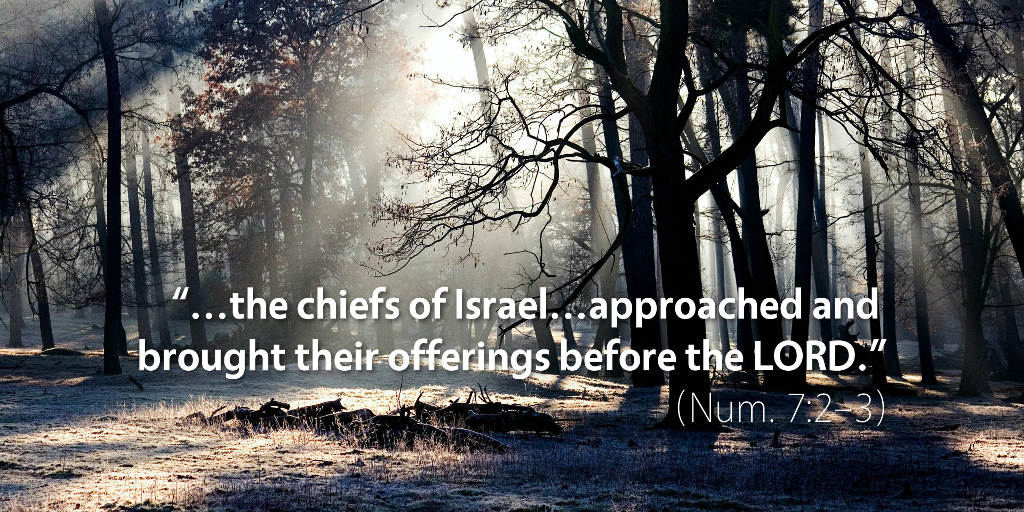Bible Readings for April 30th
Numbers 7 | Psalms 42–43 | Song of Songs 5 | Hebrews 5
Yesterday, we looked at the non-priestly class of holy people in Israel: the Nazirites. Today’s reading in Numbers 7 addresses two other issues regarding holiness within Israel’s camp.
While priests and Nazirites were the only holy people, the tabernacle was filled with many holy things. Obviously, everything used in the tabernacle had to come from somewhere, and Numbers 7 is a record of how all of the tribes of Israel contributed their share in the consecration of the temple. The chapter is repetitive, since every tribe gives precisely the same offering (which is recorded in full every time), but there are a few really interesting highlights that we want to point out along the way.
First, the word for “approached” in Numbers 7:2 and “brought them before” in 7:3, as well as the word for “offer/offered/made an offering” (Num. 7:10, 11, 12, 18, 19) are all the Hebrew word qarab, which we looked at in the meditations for Numbers 3 and 5. This was the word used to describe the crime of outsiders “coming near” (Num. 1:51), as well as the strange fire that Nadab and Abihu offered before Yahweh (Lev. 10:1; Num. 3:4)—and we should remember that both crimes were punishable by death.
As we have seen, it is a sacred, serious thing to bring near an offering into the presence of a holy God. It is not a foregone conclusion, then, that Yahweh will accept these offerings through Moses (Num. 7:4–5), but by grace, Yahweh receives the offerings that his people bring near to him.
Second, Moses is the other major exception beyond the Nazirites to the general rule that only priests were classified as holy. Moses is not a priest, since only Aaron and his descendants qualified to become priests (Ex. 28–29). Moses does perform priestly functions at times, but he really falls more under the categories of mediator and prophet than priest.
So, as covenant mediator, Moses is able to go into the tent of meeting to speak with Yahweh in the holy of holies, where the ark of the covenant was located, and as prophet, Moses hears the voice of Yahweh speaking to him from above the mercy seat (Num. 7:89).
But where Moses was a great mediator whom God used to renew his covenant with Israel and a great prophet through whom God gave Israel his law, Jesus was far better. Not only did Jesus come to inaugurate a new covenant better than the covenant of Moses (Heb. 8:8–13), and not only did Jesus become Yahweh’s last, greatest prophet (Heb. 1:2), but Jesus also came to take up two roles that Moses was not permitted to hold: to serve as our great high priest (Heb. 8:1–7) and to reign as our king forever (Heb. 1:8).
Podcast: Play in new window | Download (4.9MB) | Embed
Subscribe: Apple Podcasts | RSS | More

Scripture quotations are from The Holy Bible, English Standard Version copyright © 2001 by Crossway Bibles, a division of Good News Publishers. Used by permission. All rights reserved.


